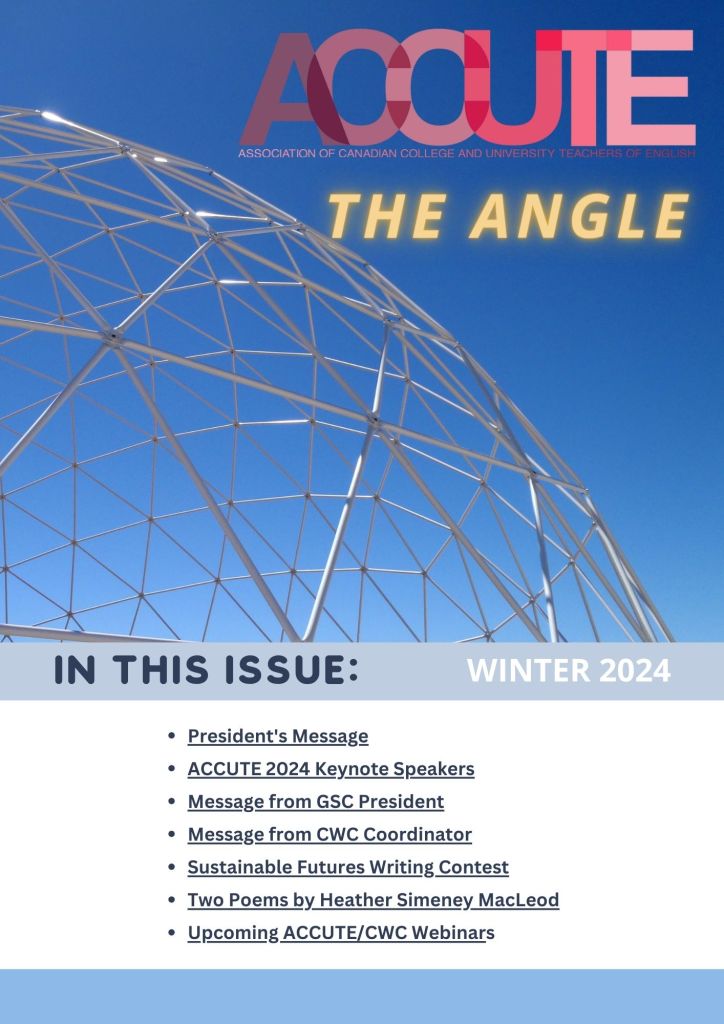From the President’s Column, ACCUTE Summer 2014 Newsletter:
Ours is essentially a corporatizing age, and I was struck by an “Inside Higher Education” newsfeed item in April telling of a study that had found that tenured and tenure-track (TT) postsecondary professors in North America contribute on average 61 hours a week to their jobs. “On average” means adding up the total working hours of all TT professors – those we know to be unceasing professional maniacs all the way down to those we suspect to be idling professional slackers – and then dividing by the number of human subjects. 61 hours: that’s what you can expect to work each week if you go into the postsecondary teaching profession now, and actually find yourself a full-time job tenure track position. However, all the statistics show that most job applicants to the professoriate will not prove so lucky. Full time contract hires happen twice as often as do TT hires; part-time contract hires outrun TT hires by a multiple of two-and-a-half. The cohort of contingent academic faculty in postsecondary education is growing three times faster than is the TT cohort, and members of that burgeoning professional majority are teaching twice as many hours in the classroom as are their TT colleagues, doing research anyway even though it’s not part of their job descriptions, doing this at about one-quarter the pay, mostly without benefits, without meaningful access to professional decision-making, and without the usual protections of academic freedom. For the new postsecondary teaching majority, 61 hours of protected and recognized professional work per week looks comparatively like a leisurely walk in the park.
And yet a March 11, 2014 Report on “Teaching Loads and Research Outputs…” by the “Higher Quality Council of Ontario” has come out in force with this critical finding: university teachers do not now teach enough. The Report’s immediate target is that “research non-active faculty member” whose presumably cavalier approach to university professionalism brings the bankable average of contributory working hours down, and one cannot help but be struck by the comparative fortunes of a profession so devalued now as to be thought in need of intervention and restructuring because that average of weekly working hours is only 61. But the Report’s public champions have not contented themselves simply with pointing the accusatory finger at the professorial “Below 61s”. The Globe & Mail’s Margaret Wente – who has some history with the avoidance (and the uncredited derivation) of research for her own publications – writes: “Research … makes more sense for somedisciplines (nanotechnology) than others (philosophy and English come to mind)…. But these days, everyone is supposed to be a teacher-scholar, even though there is little evidence that research improves teaching, or that this scholarly endeavour is worthwhile. Much of it languishes in obscure, unread journals, doomed to be uncited for all time.”
The Association of Canadian College and University Teachers of English has never been an association for languishing, uncited researchers. At our 2014 ACCUTE conference at Brock University, ESC editor Michael O’Driscoll reported that an article from our scholarly journal English Studies in Canada is downloaded once every 3.8 minutes. ACCUTE voices are everywhere, and are everywhere attended: in scholarly publications, in public debate across the spectrum of social media, and most critically, in the classroom. If anything, ACCUTE stands for the integration of research and teaching at every level of postsecondary experience. Our mandate as teachers of English in the first instance is to facilitate the exchange of research. We know just how important research in our discipline, and in related disciplines, really is to the experience of the students we teach in the classroom – whether or not we publish or cite our research findings in places that Margaret Wente bothers to access. That is why ACCUTE now finds itself so centrally involved in the work of advocacy for our members, and for those in our profession who cannot afford to be our members, including those now entering the profession at the graduate-student level, in hopes in finding human working conditions within the research-and-teaching humanities.
Our corporatizing age is witness, now, to a coordinated attack on the principle of professional integration in postsecondary education, the end goal being the structural disaggregation of research, teaching and academic administration from one another. The star system that began in the applied and natural sciences and then spread outwards has promulgated the assumption that university research can best be conducted away from the messy distraction of actual students. Thus the proliferation of research-only institutes on campus, and the massive redeployment of university operating budgets to research institutes, for projects organized around equally narrow assumptions about actual “industry” needs. Thus the proliferation of the “teaching-only” contract, and the rampant normalization of contract faculty exploitation, on the managerial assumption that postsecondary-level teachers can teach effectively without reading and writing research –especially in the so-called soft disciplines, “like philosophy and English.” Thus the extraordinary rise of a managerial class of university administrators who do no research or teaching as part of their university work, and who increasingly regard the principle of academic freedom as some archaic throw-back to a bygone professional era, when the work of the university was critical education, and not corporate productivity, in service to the profit-taking motive. That is why ACCUTE does not, has not, and will not allow itself to “languish” in its work of advocacy for research teachers at every working level within the profession of English Studies in Canada, and for progressive social change towards an equitable, inclusive, and hopeful global future.
References:
http://www.theglobeandmail.com/globe-debate/professors-need-to-teach-more/article17414147/
Categories: English Matters



